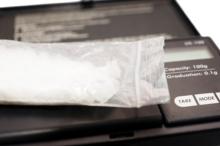Among boys and young men who have sex with men, those who also use methamphetamine appear to be at increased risk for HIV infection, according to a report in the August issue of Archives of Pediatric and Adolescent Medicine.
Compared with males aged 12-24 years who have sex with men but do not use methamphetamine, users are significantly less likely to use condoms and are more likely to acquire STDs, have sex with intravenous drug users, use other hard drugs, and have multiple sex partners, said Peter Freeman of Howard Brown Health Center and Children’s Memorial Hospital, Northwestern University, Chicago, and his associates.
Therefore, any efforts to prevent HIV infection in this age group must address substance abuse and partner selection, they noted.
Until now, little has been known about methamphetamine use and homosexual behavior among boys and young men because such research has focused on older men. "Existing data that pertain to young men who have sex with men were collected more than 15 years ago, before recent increases in the incidence of HIV. Behavior, mortality, and treatment have changed dramatically in 15 years," Mr. Freeman and his colleagues said (Arch. Pediatr. Adolesc. Med. 2011;165:736-40).
They assessed 595 young men who have sex with men using data from the Adolescent Medicine Trials Network for HIV/AIDS Interventions, a National Institutes of Health–funded prevention program. In each of eight cities (San Francisco, Los Angeles, San Diego, Chicago, Philadelphia, Washington, Baltimore, and New York), 20-30 subjects were enrolled at up to five venues such as bars, clubs, parks, and community organizations where young men who have sex with men congregated. These study subjects completed a 1-hour anonymous questionnaire regarding their drug and sexual practices.
A total of 408 of these boys and men reported never using of hard drugs and 151 reported using hard drugs within the preceding 90 days. Of these, 151, 64 reported using methamphetamine within the preceding 90 days.
Among those who recently used methamphetamine, 64% said that they were not attending school and 72% said they were currently homeless or had been homeless in the past. In comparison, 60% of subjects who had never used hard drugs were attending school and only 28% had ever been homeless.
More than half (52%) of methamphetamine users said that they had a history of at least one STD, compared with only 21% of nonusers. Similarly, significantly more methamphetamine users (86%) reported having two more sexual partners in the preceding 90 days, compared with nonusers (63%). And methamphetamine users were less likely to use a condom (33%) than were nonusers (54%), the investigators said.
Significantly more methamphetamine users said they had had sex with someone who had HIV (33%) or had had sex with someone who used IV drugs (52%), compared with nonusers (11% in both cases).
The investigators cited several limitations of the study. The study is not representative of all young men who have sex with men in the United States because the study focused on higher-risk boys and men in this demographic. In addition, methamphetamine use was classified based on self-report, "creating a classification bias."
Still, the findings indicate that HIV prevention programs for young men who have sex with men should include substance abuse and prevention components and information on partner selection, and they should address issues such as housing, education, and polydrug use, Mr. Freeman and his associates wrote.
This study was supported by the National Institute of Child Health and Human Development, the National Institute on Drug Abuse, and the National Institute of Mental Health. No financial conflicts of interest were reported.


